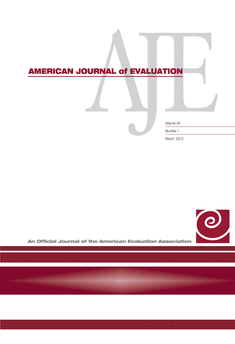
AMERICAN JOURNAL OF EVALUATION
Scope & Guideline
Connecting Scholars: A Hub for Evaluation Excellence
Introduction
Aims and Scopes
- Evaluation Theory Development:
The journal emphasizes the evolution of evaluation theories, exploring frameworks that guide evaluators in their practice and enhance the understanding of evaluation's role in different contexts. - Methodological Innovations:
It showcases innovative methodologies in evaluation, including participatory methods, quasi-experimental designs, and mixed methods approaches, providing evaluators with diverse tools for conducting evaluations. - Cultural Responsiveness and Equity:
A core focus is on culturally responsive evaluation practices that consider the diverse backgrounds of stakeholders, promoting equity and inclusivity in evaluation processes. - Policy and Program Evaluation:
The journal covers evaluations of policies and programs across various sectors, addressing the effectiveness and impact of interventions and informing decision-making. - Community Engagement:
It highlights the importance of engaging communities in the evaluation process, ensuring that evaluations are relevant and beneficial to the populations being served.
Trending and Emerging
- Racial Equity and Justice in Evaluation:
Recent publications emphasize the integration of racial equity and justice into evaluation practices, highlighting the need for evaluators to address systemic inequalities and contribute to social justice. - Participatory and Inclusive Evaluation:
There is a growing trend towards participatory evaluation methods that actively involve stakeholders in the evaluation process, fostering ownership and relevance of the evaluation outcomes. - Impact of COVID-19 on Evaluation Practices:
The journal has increasingly focused on how the pandemic has influenced evaluation approaches, methodologies, and the importance of adaptability in evaluation practices during crises. - Culturally Responsive Evaluation:
Emerging themes include culturally responsive evaluation frameworks that recognize and honor the unique cultural contexts of communities, enhancing the relevance and effectiveness of evaluations. - Evaluation Capacity Building:
There is a notable increase in discussions around building evaluation capacity within organizations and communities, emphasizing the need for training and resources to empower local evaluators.
Declining or Waning
- Traditional Evaluation Models:
There has been a noticeable decrease in publications centered around traditional evaluation models, as the field shifts towards more dynamic and participatory approaches that incorporate stakeholder voices. - Quantitative-Only Approaches:
The journal has increasingly favored mixed methods and qualitative evaluations, leading to a decline in articles focused solely on quantitative methodologies, which are perceived as less adaptable to complex social issues. - Narrowly Defined Program Evaluations:
Evaluations that focus on narrowly defined programs without broader contextual considerations or community engagement appear to be less frequent, as the journal encourages evaluations that address systemic issues and community needs.
Similar Journals
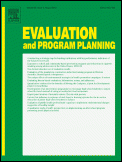
EVALUATION AND PROGRAM PLANNING
Elevating Standards in Evaluation and Program Design.Evaluation and Program Planning is a peer-reviewed academic journal published by Pergamon-Elsevier Science Ltd, focusing on critical evaluation methodologies and strategic program development across various disciplines. Established in 1978, this esteemed journal has become an essential resource for scholars and practitioners in fields such as business, geography, public health, and social psychology, boasting a robust impact factor and a consistent presence in the academic landscape, with converged years extending through 2024. With a categorization in the Q2 quartile in key areas like Business and International Management and Geography, this journal is recognized for its rigorous contributions to improving program effectiveness and policy planning. Although it does not currently offer open access options, it remains highly regarded, as evidenced by its competitive Scopus ranks. The journal aims to foster dialogue among researchers and practitioners, supporting innovative approaches to evaluation and program planning that can inform better decision-making and action. Whether you are a researcher delving into evaluation theory or a practitioner seeking practical guidance, Evaluation and Program Planning ensures relevant insights for advancing your work and the community at large.
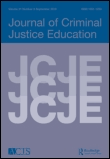
JOURNAL OF CRIMINAL JUSTICE EDUCATION
Advancing Knowledge at the Intersection of Education and JusticeJOURNAL OF CRIMINAL JUSTICE EDUCATION, published by Routledge Journals, Taylor & Francis Ltd, stands as a leading scholarly platform dedicated to the intersection of education and criminal justice. With a robust ISSN of 1051-1253 and an E-ISSN of 1745-9117, this journal provides a vital forum for the dissemination of research, critical analyses, and innovative pedagogical approaches in the field. Indexed in prestigious databases, it boasts impressive rankings—placing in Q3 in Education and Q2 in Law for 2023, with Scopus rankings of #272/1025 in Social Sciences Law and #825/1543 in Social Sciences Education. Addressing the critical needs of criminology professionals and educators, this journal seeks to bridge academic theory and practical application, thus enriching the field with its insightful contributions. While the journal does not offer open access options, researchers and practitioners are encouraged to engage with its comprehensive content to enhance their understanding and teaching within the realm of criminal justice education, fostering a more informed and effective legal system.

Canadian Journal of Program Evaluation
Elevating Standards in Evaluation PracticesCanadian Journal of Program Evaluation, published by University of Toronto Press Inc, stands as a vital resource in the field of program evaluation, encompassing a diverse array of topics relevant to researchers, practitioners, and policymakers alike. With a focus on advancing knowledge and promoting best practices in evaluating public and private programs, this journal has gained recognition in the Library and Information Sciences category, achieving a commendable Q2 ranking in the 2023 evaluations, alongside a Scopus rank of #124 out of 280 within its domain. The journal is particularly noted for its commitment to enhancing the quality and effectiveness of evaluations through rigorous research and thoughtful analysis. By engaging with cutting-edge findings and case studies from 2005 to 2023, the Canadian Journal of Program Evaluation contributes significantly to the discourse around program development and assessment. Although it does not offer open access, researchers and practitioners are encouraged to utilize this premium publication to enrich their understanding and application of evaluation methodologies.

Revista de Educacion
Championing high-quality scholarship for impactful teaching.Revista de Educacion, published by the Ministry of Education & Science in Spain, is a prominent academic journal that has been contributing to the field of education since its inception. With an ISSN of 0034-8082 and E-ISSN of 1988-592X, the journal focuses on a myriad of educational topics, encompassing innovative pedagogical practices, educational policy analysis, and advancements in learning methodologies. Featured in the Scopus database, it holds an impressive rank of 749 out of 1543 in the Social Sciences - Education category, corresponding to a 51st percentile, reflecting its significance and influence in the academic community. The journal is categorized in the Q2 quartile for the year 2023, illustrating its reputation for high-quality research and scholarship. Operating in an open-access format, it is committed to disseminating valuable knowledge and insights among researchers, educators, and students alike, fostering an environment for collaboration and growth in educational practices. This vital resource aims to address contemporary challenges in education, making it an essential read for anyone invested in the future of learning.
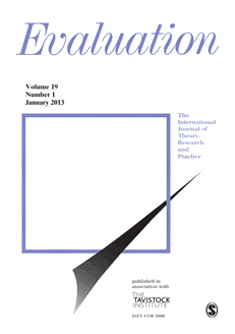
Evaluation
Transforming insights into actionable evaluation practices.Evaluation is a leading academic journal published by SAGE Publications Inc, specializing in the fields of Development and Sociology and Political Science. Established in 1995 and continuing through 2024, this journal is renowned for its commitment to advancing knowledge through rigorous peer-reviewed research. With an impressive impact factor endorsed by its Q2 category ranking in Development and Q1 category ranking in Sociology and Political Science as of 2023, Evaluation serves as an essential platform for scholars, policymakers, and practitioners seeking to explore the complexities of evaluation processes within societal contexts. Although the journal operates under a traditional access model, the depth and relevance of its articles ensure it remains a critical resource in the academic community. By positioning itself at the intersection of development studies and social sciences, Evaluation not only promotes dialogue but also informs practices that influence social change, making it a vital resource for anyone dedicated to understanding and improving societal outcomes.
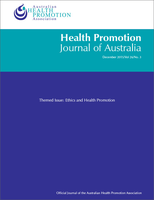
Health Promotion Journal of Australia
Advancing health promotion for a healthier tomorrow.The Health Promotion Journal of Australia, published by Wiley, is a premier journal dedicated to advancing the field of health promotion and public health. With its ISSN 1036-1073 and E-ISSN 2201-1617, this journal has served as a vital resource for researchers, practitioners, and students in Australia and beyond since its inception in 2002. Currently holding a commendable Q2 ranking in both the Community and Home Care and Public Health, Environmental and Occupational Health categories (2023), it is recognized for its contribution to critical discussions and innovative solutions in health promotion. The journal offers valuable insights and data, drawn from a diverse array of research articles, reviews, and case studies that address pressing issues in the field. With a focus on practical applications and evidence-based practices, the Health Promotion Journal of Australia aims to foster collaboration and knowledge exchange among health professionals and researchers, making it an essential reading for anyone committed to improving public health outcomes.
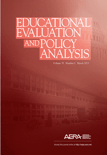
EDUCATIONAL EVALUATION AND POLICY ANALYSIS
Advancing Knowledge for Effective Educational ChangeEDUCATIONAL EVALUATION AND POLICY ANALYSIS, published by SAGE Publications Inc, is a leading journal in the field of education, dedicated to fostering scholarly research and discourse on educational evaluation and policy. With an impressive impact factor, the journal is categorized in the Q1 quartile for education in 2023, placing it among the top-tier publications in the discipline. Since its inception in 1979, the journal has provided a vital platform for researchers and policymakers to share insights and innovations that shape the future of education. With its current Scopus ranking of #156 out of 1543 in the Social Sciences Education category, and a remarkable 89th percentile ranking, the journal is recognized for its rigorous scholarly contributions. Although it does not operate under an Open Access model, it offers various subscription options to access thought-provoking articles, reviews, and policy analyses that address contemporary challenges in education. By highlighting evidence-based insights and advocacy for effective policies, EDUCATIONAL EVALUATION AND POLICY ANALYSIS plays a crucial role in driving informed decisions and contributing to the advancement of educational systems globally.
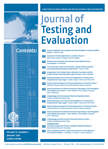
JOURNAL OF TESTING AND EVALUATION
Transforming Knowledge into Practical ApplicationsWelcome to the JOURNAL OF TESTING AND EVALUATION, an esteemed publication dedicated to the fields of materials science and mechanical engineering, published by the American Society for Testing and Materials. With a history of excellence since its inception in 1973 and a convergence of insightful research extending to 2024, this journal serves as a pivotal platform for disseminating innovative research, methodologies, and findings in testing and evaluation processes. Although it is not an open-access journal, it holds a respectable impact with a ranking in the third quartile across various categories and Scopus ranks, making it an important resource for academic and industry professionals alike. By providing rigorous evaluation of materials and engineering practices, the JOURNAL OF TESTING AND EVALUATION continues to shape the future of research in these dynamic fields, offering vital contributions that are essential for advancing knowledge and practical applications.

Studies in Educational Evaluation
Fostering innovation in educational practices and policies.Studies in Educational Evaluation is a premier journal published by Elsevier, specializing in the critical evaluation of educational practices and policies. Established in 1975, this esteemed journal serves as a vital resource for researchers and practitioners engaged in the ever-evolving field of education. With its impressive Q1 ranking in the Education category and positioned at the 90th percentile among its peers in Scopus rankings, it reflects a high standard of scholarly excellence. The journal aims to disseminate innovative research that fosters deeper understanding and effective assessment frameworks within educational contexts, making it indispensable for educators, policymakers, and researchers alike. Although it currently does not offer open access, the insights found within its pages are crucial for driving improvements in educational evaluation methodologies globally. Located in the United Kingdom, and available for wide readership, Studies in Educational Evaluation is committed to pushing the boundaries of knowledge in education assessment through rigorous, peer-reviewed scholarship.
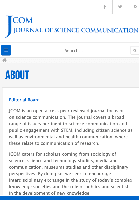
JCOM-Journal of Science Communication
Unlocking Knowledge: Engaging the Public in ScienceJCOM - Journal of Science Communication is a premier, peer-reviewed journal dedicated to enhancing the dialogue between science and society. Established in 2002 by the Scuola Internazionale Superiore di Studi Avanzati in Italy, it has become an essential platform for research in the field of science communication, reflecting the growing importance of effective communication in the advancement of scientific knowledge. The journal boasts an impressive Open Access model, encouraging widespread dissemination of critical research findings. With a notable impact in the Communication category, ranking in the Q2 quartile, and achieving a remarkable 77th percentile in Scopus ranks, JCOM positions itself as a crucial resource for scholars, professionals, and students alike. With a broad scope covering interdisciplinary aspects of science communication, the journal aims to foster innovative research and discussions that bridge the gap between scientific communities and the public. Located in Trieste, Italy, JCOM invites contributions that elevate the standards and practices of communicating science in an increasingly complex world.